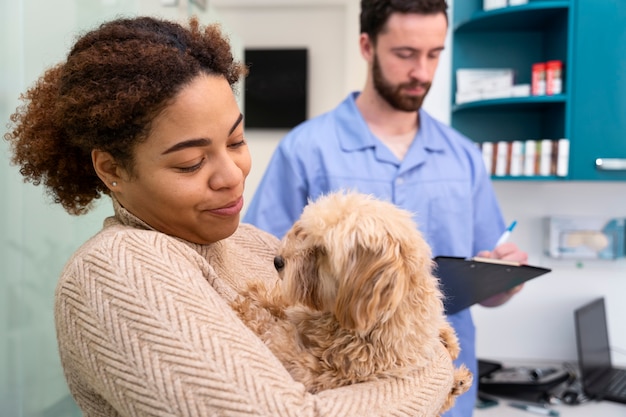How to Spot Early Signs of Pet Illness


How to Spot Early Signs of Pet Illness: A Guide for Alexandria Pet Owners
As pet owners, we all hope our furry family members will always be happy and healthy. Yet, just like us, pets can develop illnesses that may not always be obvious at first glance. At Rapides Animal Medical Center, located at 5990 Jackson Street, Alexandria, LA 71303, our veterinary team understands how important it is for you to catch the earliest signs of pet illness before they progress into something more serious. Recognizing subtle changes in your pet’s behavior or physical health can make all the difference in ensuring they receive timely care.
This guide will help you understand what to look for, why early detection matters, and when to schedule a visit with our veterinarians. We’ll also discuss the value of pet diagnostic laboratory services in Alexandria and how a comprehensive wellness examination can set your pet up for lifelong health. If you’ve ever found yourself searching for a “vet near me” during a moment of concern, this resource will give you the confidence to take action and know when to reach out for professional help.
At Rapides Animal Medical Center, we’re proud to provide full-service veterinary care for Alexandria and surrounding communities, always focusing on your pet’s comfort and your peace of mind. Our veterinarians are here to support you every step of the way, from routine wellness exams to advanced diagnostics.
Recognizing the First Signs of Pet Illness
Understanding the early warning signs of pet illness is the first step toward keeping your dog or cat healthy. Since pets can’t explain how they’re feeling, they rely on you to notice when something isn’t quite right. Often, the earliest symptoms are subtle and easy to overlook, especially if you’re busy with daily routines or if your pet is especially stoic.
Typical signs of pet illness include changes in appetite such as eating less or refusing food altogether. You might also observe vomiting or diarrhea, increased thirst or urination, or sudden weight loss or gain. Lethargy is another red flag; if your usually energetic pet seems tired, withdrawn, or less interactive, it’s time to pay attention. Some pets may start hiding more often or become unusually clingy. Coughing, sneezing, nasal discharge, or labored breathing can indicate respiratory issues. Visible discomfort, such as limping or sensitivity when touched, could point to injuries or joint problems. Additionally, skin and coat changes like persistent scratching, bald spots, or sores may signal allergies or infections.
Behavioral shifts are just as important to recognize. If your pet becomes irritable, aggressive, or unusually vocal, these might be their way of communicating pain or distress. Watch for changes in bathroom habits, such as urinating outside the litter box or having accidents inside the house. Dental problems often present as bad breath, drooling, or difficulty chewing.
These symptoms can develop gradually or appear suddenly. Because many illnesses progress quietly, regular observation and a keen awareness of your pet’s baseline behavior are essential.
Why Do Pets Get Sick? Understanding the Causes
There are many reasons why pets get sick, and understanding these causes can help you protect your companion. Infectious diseases, such as viruses and bacteria, are common culprits, especially in pets who interact with other animals. Parasites like fleas, ticks, and worms can also undermine your pet’s health, causing symptoms that range from mild itching to severe digestive upset.
Chronic conditions, including diabetes, kidney disease, and heart problems, often develop with age and may not show clear signs until they are more advanced. Poor dental health, meanwhile, can lead to infections that affect the entire body. Environmental factors, such as exposure to toxins, spoiled food, or harmful plants, can trigger sudden illness. In Louisiana’s warm, humid climate, heatstroke and tick-borne diseases are particular concerns during the summer months.
Genetics can play a role as well. Some breeds are predisposed to certain health problems, such as hip dysplasia in large dogs or respiratory issues in flat-faced breeds. Poor nutrition or irregular feeding routines may also set the stage for gastrointestinal problems or obesity.
Lastly, stress and anxiety can weaken your pet’s immune system, making them more vulnerable to illness. Moving to a new home, changes in routine, or the addition of a new pet can all impact your pet’s physical and emotional well-being.
How Veterinarians Diagnose and Treat Early Illness
When you notice signs of pet illness, the next step is to schedule a wellness examination with our veterinary team. Timely intervention can mean the difference between a quick recovery and a more complicated health journey. At Rapides Animal Medical Center, we use a combination of hands-on exams and advanced diagnostics to get to the root of your pet’s problems.
During a wellness exam, our veterinarians will review your pet’s medical history, discuss any changes you’ve observed, and perform a thorough physical checkup. If symptoms suggest an underlying issue, we may recommend further testing. Our pet diagnostic laboratory services in Alexandria allow us to quickly analyze blood, urine, and stool samples for signs of infection, organ dysfunction, or metabolic disorders. Imaging techniques such as digital radiology and veterinary ultrasounds help us visualize internal organs and detect issues that might not be apparent during a standard exam.
Treatment options are tailored to your pet’s specific needs and diagnosis. If an infection is detected, we may prescribe antibiotics or other medications. For conditions like diabetes or kidney disease, ongoing management with proper medication, diet, and monitoring will be necessary. Dental problems might require professional cleaning, extractions, or pet dental cleanings to address infection and pain.
We believe in a comprehensive approach to care, which means providing not only immediate treatment but also recommendations for at-home support and preventive strategies to help your pet recover and thrive.
Proactive Steps You Can Take at Home
While some illnesses require professional intervention, there are many proactive steps you can take to support your pet’s health and catch problems early. Regularly monitoring your pet’s appetite, energy level, and bathroom habits will provide valuable clues about their well-being. Establishing a consistent feeding and exercise routine can help you spot deviations that might signal trouble.
Maintaining good dental health through tooth brushing and dental treats is essential for preventing oral disease. Keeping up with parasite prevention—such as monthly flea, tick, and heartworm medications—is especially important in the Alexandria region, where the climate can increase risk. Make sure your pet’s vaccinations are up to date and that you visit your veterinarian for scheduled wellness checks.
If your pet has a chronic condition, follow your veterinarian’s instructions closely regarding medication, diet, and regular monitoring. Create a comfortable and low-stress environment at home, and provide plenty of mental stimulation and affection to keep your pet happy and engaged.
Cleaning your pet’s bedding and living areas regularly, as well as providing clean water at all times, will further support their immune system. If you notice any changes in your pet’s health or behavior, document your observations so you can provide your veterinarian with detailed information during your next visit.
When to See a Veterinarian: Don’t Wait for Advanced Illness
Knowing when to see a vet is crucial for your pet’s health and safety. If you observe any of the warning signs discussed—such as persistent vomiting or diarrhea, difficulty breathing, sudden behavioral changes, or signs of pain—it’s important to schedule an appointment promptly. Early intervention leads to better outcomes and can prevent minor issues from becoming major health concerns.
For less urgent situations, such as mild loss of appetite or minor changes in energy, it’s still wise to contact your veterinary team and discuss your observations. Our veterinarians can advise you on whether your pet should be seen immediately or if a watchful waiting approach is appropriate.
If your pet is experiencing symptoms that progress rapidly or seem severe, such as collapse, seizures, or inability to urinate, seek emergency veterinary care without delay. For most concerns, however, a wellness examination at Rapides Animal Medical Center in Alexandria will allow us to assess your pet’s health and provide the right treatment plan.
Our team is dedicated to serving Alexandria and the surrounding communities with compassionate, comprehensive care. Whether you’re searching for the “best veterinarian near me” or need guidance on pet diagnostics in Alexandria, we are here to help every step of the way.
Keeping Your Pet Healthy: Schedule Your Next Exam Today
Catching the early signs of pet illness can make a world of difference in your pet’s long-term health and happiness. By staying alert to subtle changes, scheduling regular wellness visits, and partnering with an experienced veterinary team, you can help your pet live a longer, more comfortable life.
If you have questions about your pet’s health, don’t wait—contact Rapides Animal Medical Center to schedule an examination at our Alexandria location. You can also learn more about our pet diagnostic laboratory services in Alexandria and how we support early detection and treatment of illness.
Our veterinary professionals are committed to providing trusted, local care for pets and their families. If you’re looking for a “vet near me” who truly cares about proactive, preventive medicine, we invite you to experience our client-focused approach.
To schedule your pet’s next appointment, call (318) 445-5245 or visit our website to book online. Together, we’ll ensure your companion receives the quality veterinary services in Alexandria they deserve—today and for years to come.
Medical Disclaimer: This blog is intended for informational purposes only and is not a substitute for professional veterinary advice. If your pet is showing signs of illness, please consult with your veterinarian promptly.


















